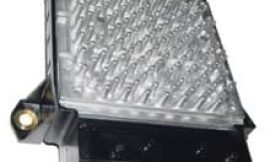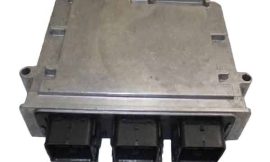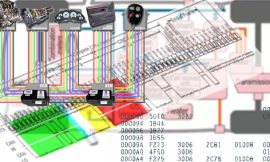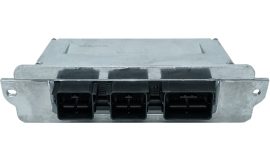Last updated on November 1st, 2024 at 11:36 am
The Acura Integra, first introduced in 1985, holds a significant place in automotive history. With its innovative blend of sportiness and luxury, it redefined the concept of the compact sports car and quickly became an icon among car enthusiasts. The Integra was not just another car; it was a symbol of Acura’s commitment to performance, precision, and style.
One of the key factors contributing to the Integra’s impressive performance is its Engine Control Unit (ECU). The ECU, acting as the car’s computerized brain, monitors and adjusts crucial components of the engine, optimizing fuel efficiency and enhancing performance. For the Integra, this meant smoother acceleration, improved handling, and superior fuel economy – all components of the car’s iconic status. The ECU’s role in the Integra’s performance showcases the advancements in automotive technology, and how they contribute to the driving experience.

Common ECU-Related Issues in Integra
Despite the high standards of Acura, Integra owners can sometimes face issues that are often traced back to a failing ECU. A faulty ECU can lead to erratic engine behavior, including sporadic misfires and inconsistent throttle response. These conditions not only hamper the performance but also impact the fuel efficiency, thereby affecting the overall driving experience. Additionally, a malfunctioning ECU might lead to the ‘Check Engine’ light illuminating on the dashboard, indicating issues with the car’s diagnostic system. In severe cases, the Integra may fail to start altogether, a symptom that is commonly linked to a failing ECU.
Benefits of a Quality ECU in an Integra
A quality ECU can significantly enhance the performance, fuel efficiency, and safety of your Acura Integra. By accurately regulating the fuel-air mixture for combustion, a good ECU ensures optimal engine performance, resulting in smoother acceleration and better handling. This precise control also means improved fuel efficiency, as the ECU can adjust the fuel injection based on the engine’s real-time needs, reducing wastage and saving on fuel costs.
As for safety, a quality ECU plays a crucial role as well. By monitoring various engine parameters and vehicle sensors, it can detect any abnormalities or potential issues early on. For instance, the ECU can alert the driver if there’s a risk of engine overheating, or if there’s a fault in the braking system. This early detection of potential problems allows for timely maintenance and repair, ensuring not only the longevity of the vehicle but also the safety of the driver and passengers.
In short, investing in a quality ECU for your Acura Integra is a decision that pays dividends in terms of performance, fuel efficiency, and safety. At Flagship One, Inc., we offer top-of-the-line ECUs that adhere to these high standards, ensuring that your Integra remains a symbol of performance and precision.

Long-Term Savings
A quality ECU can significantly contribute to fewer repairs and better longevity for your Acura Integra. By maintaining optimal engine performance and detecting potential problems early, a high-quality ECU can help prevent severe damage and expensive repairs. For example, the ECU can identify if the fuel-air mixture is too rich or lean, which can potentially harm the engine over time. By adjusting this mixture promptly, the ECU prevents such harmful scenarios, thereby extending the lifespan of your engine. Furthermore, by monitoring various vehicle sensors, the ECU can detect minor issues before they escalate into significant problems that could potentially lead to critical failures.
In conclusion, investing in a high-quality ECU for your Acura Integra is a smart decision that brings tangible benefits. A superior ECU elevates the performance of your vehicle, ensuring smooth acceleration and optimal handling, while also enhancing fuel efficiency to save on costs. Additionally, its crucial role in detecting potential issues early on contributes significantly to your safety on the road.
Therefore, by prioritizing a quality ECU, you’re not only ensuring a rewarding driving experience but also preserving the legacy of performance and precision that the Acura Integra is known for. At Flagship One, Inc., we are committed to providing our clients with top-tier ECUs that uphold this standard, making your investment worthwhile.
DIAGNOSTIC TROUBLE CODES THAT RELATES TO THE PCM
Diagnostic Trouble Codes (DTCs) are codes that are stored by a vehicle’s on-board diagnostic (OBD) system when it detects a fault with the vehicle’s powertrain system.
P0100: Mass or Volume Air Flow Circuit Malfunction
P0101: Mass or Volume Air Flow Circuit Range/Performance
P0102: Mass or Volume Air Flow Circuit Low Input
P0103: Mass or Volume Air Flow Circuit High Input
P0110: Intake Air Temperature Circuit Malfunction
P0113: Intake Air Temperature Sensor 1 Circuit High
P0172: System Too Rich (Bank 1)
P0120: Throttle/Pedal Position Sensor/Switch “A” Circuit Malfunction
P0130: Oxygen Sensor Circuit Malfunction (Bank 1, Sensor 1)
P0131: Oxygen Sensor Circuit Range/Performance (Bank 1, Sensor 1)
P0132: Oxygen Sensor Circuit High Voltage (Bank 1, Sensor 1)
P0133: Oxygen Sensor Circuit Slow Response (Bank 1, Sensor 1)
P0134: Oxygen Sensor Circuit Intermittent (Bank 1, Sensor 1)
P0135: Oxygen Sensor Circuit Malfunction (Bank 1, Sensor 2)
P0136: Oxygen Sensor Circuit Range/Performance (Bank 1, Sensor 2)
P0137: Oxygen Sensor Circuit Low Voltage (Bank 1, Sensor 2)
P0138: Oxygen Sensor Circuit High Voltage (Bank 1, Sensor 2)
P0139: Oxygen Sensor Circuit Intermittent (Bank 1, Sensor 2)
P0140: Oxygen Sensor Circuit Malfunction (Bank 2, Sensor 1)
P0141: Oxygen Sensor Circuit Range/Performance (Bank 2, Sensor 1)
P0142: Oxygen Sensor Circuit Low Voltage (Bank 2, Sensor 1)
P0143: Oxygen Sensor Circuit High Voltage (Bank 2, Sensor 1)
P0144: Oxygen Sensor Circuit Intermittent (Bank 2, Sensor 1)
Here is a list of some diagnostic trouble codes (DTCs) that begin with the letter “U” and could potentially indicate a fault with the powertrain control module (PCM) in a vehicle:
U0100: Lost Communication with Engine Control Module/Powertrain Control Module
U0101: Lost Communication with Transmission Control Module
U0102: Lost Communication with Transfer Case Control Module
U0103: Lost Communication with Throttle Actuator Control Motor Circuit
U0104: Lost Communication with Throttle Actuator Control Motor Circuit Range/Performance
U0105: Lost Communication with Throttle Actuator Control Motor Circuit Low
U0106: Lost Communication with Throttle Actuator Control Motor Circuit High
U0107: Lost Communication with Throttle Actuator Control Motor Circuit Intermittent
U0108: Lost Communication with Throttle Actuator Control Motor Circuit Open
U0109: Lost Communication with Throttle Actuator Control Motor Circuit Short to Ground
U0110: Lost Communication with Throttle Actuator Control Motor Circuit Short to Battery
U0111: Lost Communication with Throttle Actuator Control Motor Circuit Short to Power
U0112: Lost Communication with Throttle Actuator Control Motor Circuit Short to Ground
U0113: Lost Communication with Throttle Actuator Control Motor Circuit Short to Battery
U0114: Lost Communication with Throttle Actuator Control Motor Circuit Short to Power
U0115: Lost Communication with Throttle Actuator Control Motor Circuit Failure
U0116: Lost Communication with Throttle Actuator Control Motor Circuit Range/Performance
Note: These codes are just a small sample and there are many other DTC codes that could potentially indicate a fault with the PCM. Additionally, the specific codes that are relevant will depend on the make and model of the vehicle. It is important to consult the vehicle’s service manual or a professional mechanic for more information about interpreting DTC codes.














